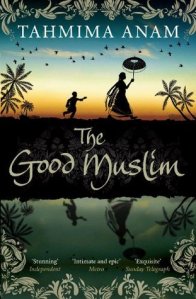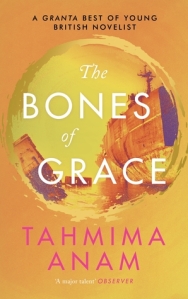Dear Husband,
I lost our children today.
What an opening line. Tahmima Anam’s A Golden Age plunges you right into the twin events that form the basis of Rehana’s character as a parent, fiercely protective and determined to have them near her.
Dear Husband,
Our children are no longer our children.
The death of her husband and her fight to keep her children, when her dead husband’s brother and his childless wife claim they could take better care of them.
The first chapter begins with that day in 1959 when the court gives custody to her brother and sister-in-law, who live in Lahore, (West Pakistan) over 1000 miles and an expensive flight away from Dhaka (East Pakistan).
The novel then jumps forward and is set in 1971, in Dhaka, the year of its war of independence, when East separated from West Pakistan and became Bangladesh (when you look at the area on a map, they are geographically separate, with no common border, India lies between them).

In 1971, Rehana’s children, Maya and Sohail are university students and back living with their mother after she discovered a way of becoming financially independent without having to remarry. Despite her efforts to protect them, she is unable to stop them becoming involved in the events of the revolution, her son joining a guerrilla group of freedom fighters and her daughter leaving for Calcutta to write press releases and work in nearby refugee camps.
He’ll never make a good husband, she heard Mrs Chowdhury say. Too much politics.
The comment had stung because it was probably true. Lately the children had little time for anything but the struggle. It had started when Sohail entered the university. Ever since ’48, the Pakistani authorities had ruled the eastern wing of the country like a colony. First they tried to force everyone to speak Urdu instead of Bengali. They took the jute money from Bengal and spent it on factories in Karachi and Islamabad. One general after another made promises they had no intention of keeping. The Dhaka university students had been involved in the protests from the very beginning, so it was no surprise Sohail had got caught up, Maya too. Even Rehana could see the logic: what sense did it make to have a country in two halves, posed on either side of India like a pair of horns?
Rather than lose her children again, Rehana supports them and their cause, finding herself on the opposite side of a conflict to her disapproving family who live in West Pakistan.
As she recited the pickle recipe to herself, Rehana wondered what her sisters would make of her at this very moment. Guerillas at Shona. Sewing kathas on the rooftop. Her daughter at rifle practice. The thought of their shocked faces made her want to laugh.She imagined the letter she would write. Dear sisters, she would say. Our countries are at war; yours and mine. We are on different sides now. I am making pickles for the war effort. You see how much I belong here and not to you.
Anam follows the lives of one family and their close neighbours, illustrating how the historical events of that year affected people and changed them. It is loosely based on a similar story told to the author by her grandmother who had been a young widow for ten years already, when the war arrived.
When I first sat down to write A Golden Age, I imagined a war novel on an epic scale. I imagined battle scenes, political rallies, and the grand sweep of history. But after having interviewed more than a hundred survivors of the Bangladesh War for Independence, I realised it was the very small details that always stayed in my mind- the guerilla fighters who exchanged shirts before they went into battle, the women who sewed their best silk saris into blankets for the refugees. I realised I wanted to write a novel about how ordinary people are transformed by war, and once I discovered this, I turned to the story of my maternal grandmother, Mushela Islam, and how she became a revolutionary.
It’s a fabulous and compelling novel of a family disrupted by war, thrown into the dangers of standing up for what they believe is right, influenced by love, betrayed by jealousies and of a young generation’s desire to be part of the establishment of independence for the country they love.
It is also the first novel in the Bangladesh trilogy, the story continues in the books I will be reading next The Good Muslim and the recently published The Bones of Grace.
Tahmima Anam was born in Dhaka, Bangladesh, but grew up in Paris, Bangkok and New York. She earned a Ph.D. in Social Anthropology from Harvard University and a Master’s degree in Creative Writing from Royal Holloway in London. A Golden Age won the Commonwealth Writers’ Prize for Best First Book and was the first of a planned trilogy she hoped would teach people about her native country and the vicious power of war.
In 2013 she was included in the Granta list of 20 best young writers and her follow-up novel The Good Muslim was nominated for the 2011 Man Asian Literary Prize.




This sounds great. I went through a phase some years ago of reading loads of Asian literature – I probably read so much that I got to the point when I had had enough of it. Still I might look out for this series. The cover art is gorgeous.
LikeLiked by 1 person
Yes, I think before I discovered translated fiction, I read a lot more fiction written by writers of Asian origin, because it was one of the few routes to discovering lives in other cultures through literature and often the stories were tragic as many of them had fled (or their parents had) a dire situation.
Bangladesh I know little about though, so it’s good to come across a new writer with a great storytelling ability that also informs us a little of the history and a bit of background to things we hear about in the news today.
LikeLiked by 1 person
This sounds really interesting – I should really widen my choice of books, to include this part of the world (which I know very little of).
LikeLiked by 1 person
That’s why The Bones of Grace jumped out at me, which is published this month, but when I discovered it was the third book in a trilogy I had to go back to the beginning and read the first two first and so glad I did.
Coincidentally Dhaka is back in the news now with reports of terrible violence occurring and this from May 2016:
LikeLiked by 1 person
I know! I almost thought you were reading it in response to the terrible news, but reckoned it would have taken you a while to read, so you must have started before.
LikeLiked by 1 person
Yes, a complete coincidence, I was just wondering where Dhaka was when I heard it mentioned on the news, bizarre indeed, especially with the third book in the trilogy being published right now.
LikeLike
Great review. Sounds like a riveting read and the quotes show how beautiful the writing is.
LikeLiked by 1 person
It was an excellent and insightful read, with confidently written characters, I’m looking forward to the next two books.
LikeLiked by 1 person
I’ve read The Good Muslim which I thought was excellent. I didn’t realise it was part of a trilogy.
LikeLike
Yes, I didn’t realise The Bones of Grace was part of a trilogy until I saw it on Goodreads with (Bangladesh #1) next to the title. I think they can all be read as separate titles, but you must read A Golden Age, it’s excellent!
LikeLiked by 1 person
Sounds fabulous. And between the horrible and tragic events that just made Dhaka a front page news story and such a turbulent and divided election year in the US, what better time to read it. Thanks, as always, for bring books to my attention I’d probably never hear about.
LikeLiked by 1 person
I’ve been really interested to read a little of the history of Bangladesh Fransi and of the Bengal people and how post colonial borders have created much of the tension that we see today, highlighting differences rather than allowing people to live happily side by side, when in fact they all descend from similar roots and it’s just their life philosophies that shift over the years, creating stupid reasons for war, inciting generational hatred, depriving people of the chance to create lives that might fufill their needs, turning them towards the destructive.
LikeLiked by 1 person
Inequality, senseless hatred, divisiveness, it’s happening everywhere and it’s destructive everywhere. And all of it unnecessary.
LikeLiked by 1 person
Sounds like another great choice, I know little of the history of Bangladesh apart from what the National Geographic occasionally tells me, I will be seeking this out post haste.
LikeLiked by 1 person
I’ve enjoyed reading about Bangladesh, its geography, history and the people of Bengal SteJ, it’s fascinating and so little known, I hope this inspires you to learn more about this region and that you find it as fascinating as I have.
LikeLiked by 1 person
It most certainly does, any excuse to pick up more books really.
LikeLiked by 1 person
This sounds fantastic, Claire. Bones of Grace is on my TBR so now I’m wondering whether I should start at the beginning too.
LikeLiked by 1 person
I had no idea it was a trilogy and I started to read The Bones of Grace and then decided I had to read the first two, so glad I did, A Golden Age in particular really got me looking at the geography and political history of the area, and also there’s a wonderful essay in the back of my version of A Golden Age where Tahmima Anam talks about her research and motivation to write the book which really adds something to the reading experience. I can’t wait to read the final version, especially as she’s grown as a writer along the way. That said, I think they can be read stand alone as well.
LikeLiked by 1 person
Brilliant, I’ve ordered them. I love reading trilogy’s back-to-back.
LikeLiked by 1 person
Me too, nothing like a good trilogy, I’m holding off reading Hilary Mantel’s until part three of hers comes out!
LikeLike
Oh, Claire, you are in for SUCH a treat. I’m quite envious of you.
LikeLiked by 1 person
This sounds really great. I have never really read anything set there so I am intrigued by the trilogy. Great review.
LikeLiked by 1 person
I love how good fiction inspires us to learn more about the history and people of the world and this one really got me reading outside the book to find out how Bangladesh came into being. The history of the Bengal people is fascinating.
LikeLike
This sounds really interesting. I read ‘The Bones of Grace’ this year without knowing it was a trilogy – you’ve really made me want to go back and catch up!
LikeLiked by 1 person
Oh you should, I’m looking forward to The Bones of Grace, clearly it can be read as a stand alone novel, but I couldn’t help but go back and start at the beginning.
LikeLiked by 1 person
Pingback: The Good Muslim (Bangladesh #2) by Tahmima Anam – Word by Word
Adding to my TBR list. Thanks!
LikeLiked by 1 person
Pingback: The Bones of Grace (Bangladesh #3) by Tahmima Anam – Word by Word
Pingback: Train to Pakistan by Khushwant Singh – Word by Word